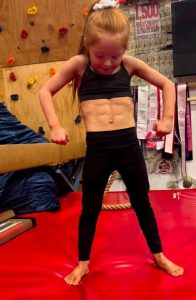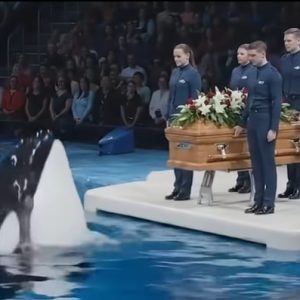In today’s world, where social media often defines beauty and athletic standards, one young gymnast has become the center of a growing debate. Kynlee Heiman, an 8-year-old with a visibly toned six-pack, has both inspired and alarmed the internet after videos of her training and physique went viral.
Many have praised Kynlee’s discipline, talent, and dedication to gymnastics. But others are concerned about the intensity of her training — and the potential consequences of such a demanding routine at such a young age.
Her mother has fiercely defended her daughter’s regimen, claiming Kynlee’s muscular build is mostly “genetic and natural.” According to her, the abs come with the sport: “In gymnastics, they’re just kind of there. She doesn’t do endless sit-ups.” She adds that Kynlee still enjoys being a kid — including the occasional junk food snack — and that she isn’t held to a strict diet.

Kynlee herself says she trains up to six hours a day, a mix of gymnastics practice and bar work. While her mother insists Kynlee is just a regular kid at home who “fights with her brothers and competes with them,” critics argue that such a schedule could rob a child of a normal childhood.
Supporters say Kynlee is a shining example of commitment and hard work. Still, the question remains: Where is the line between encouragement and overtraining?
Medical professionals and youth sports experts caution against pushing young athletes too hard, too soon. Dr. Blaise Nemeth, of the American Academy of Pediatrics’ Council on Sports Medicine and Fitness, recommends that children only engage in organized sports for a number of hours per week equal to their age. That means a child Kynlee’s age should cap training at about 8 hours a week — far less than her reported routine.

Experts also stress the importance of age-appropriate training programs and ample recovery time. “Overtraining can lead to fatigue, reduced performance, and injuries,” they warn. Rest days, proper sleep, hydration, and nutrition are essential for growing bodies. Without these, the risks may outweigh the rewards.
Another concern is the long-term goal of youth sports. Pediatric sports professionals emphasize that early specialization shouldn’t be about creating the best 10-year-old in the gym — it should focus on fostering physical literacy and development that allows young athletes to thrive long-term, particularly during the high school and college years if they choose to continue competing.

While Kynlee’s story has become a viral sensation, it’s also sparked vital conversations about childhood, parenting, and what it means to support — or possibly pressure — young athletes in a social media-driven age.

Meanwhile, across social platforms, even adult celebrities aren’t immune to public scrutiny. Actress Eva Longoria drew headlines this week for sharing a photo in a tiny bikini — and one unexpected detail triggered its own wave of online backlash.





